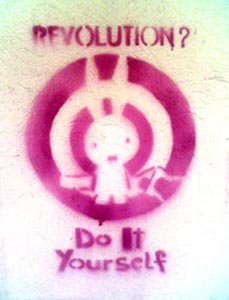 Dop l'articolo postato alcuni giorni fa dal titolo Going to jail e scritto da Francesca, un commento di lilli ha segnalato la seguente intervista ad Angela Davis che offre in poche parole la sintesi massima della summa del suo pensiero sul sistema carcerario statunitense, o meglio del prison industrial complex.
Dop l'articolo postato alcuni giorni fa dal titolo Going to jail e scritto da Francesca, un commento di lilli ha segnalato la seguente intervista ad Angela Davis che offre in poche parole la sintesi massima della summa del suo pensiero sul sistema carcerario statunitense, o meglio del prison industrial complex.Grazie della segnalazione e buona lettura!
L'intervista è tratta da blackademics.org.
Intro:
Dr. Angela Davis is a radical activist, feminist and author, former political prisoner, and the Presidential Chair at the University of California, Santa Cruz. She is a founder of Critical Resistance, a grassroots prison abolition movement, but we’ll get to that later in the interview. This is History y’all. Angela Davis ran with the Black Panthers, in the 70s she became the third woman ever to appear on the FBI’s Ten Most Wanted Fugitives List. She’s been grinding on our behalf for quite some time and the grind continues, so let’s get to the interview.
Pierce Freelon: I know you have a book coming out about the prison industrial complex, and I feel like a lot of young black scholars aren’t really aware of the issues, so I was wondering if you could talk briefly about the prison industrial complex and why it’s so important that we as scholars embrace and challenge this issue.
Angela Davis: Well, of course, as Black people we are all aware of the centrality of imprisonment in the… community both now and historically. The prison industrial complex is a bit more than the collection of all of the jails and prisons that exist in this country. That concept, the concept of the prison industrial complex, attempts to capture the relationships among prisons and corporations and elected officials and governments. So we’re talking about relationships, we’re talking about the extent to which imprisonment serves as a source of corporate profit, much in the way that military production becomes a major sector of the US economy. There is a global dimension to the prison industrial complex, prisons are becoming central to the management of societies all over the world, and especially now in Africa and Asia and Latin America and in the countries of the south. The work that I’ve been doing, along with many other people over the last I don’t know 10-15 years, really focuses on the demand for the abolition of the prison. Prison abolition. So many people refer to me as being involved in prison reform and I say no, I’m not. I don’t want to reform the prison; I don’t want to make better prisons. Although I do want to make conditions better for the 2.2 million people in this country who are behind bars. And of course for the many people who are in prisons controlled by the US, particularly military prisons all around the world. I do want to make conditions better for them but I don’t want to build better institutions, I want us to think about the possibility of getting rid of the prison as the major institution of social control in this society.
PF: Okay, thank you. Umm, there’s a criticism of our generation as young, upcoming scholars that we’re not as active or as militant as yall were back in the 60s or 70s. I wanted to know if you agreed with that and either way, what can we do to achieve some the accomplishments that your generation of scholars and activists was able to achieve?
AD: Well, I think it’s a false claim. And I do think that there’s an enormous amount of concern among young people today. Especially young Black activists and scholars I think there is a great deal of activism. It’s not the same because we don’t live in the same time. And I try not to compare what is going on today to what we did 30 years ago. My message is always that each generation has to find it’s own way. And it may be a different way, it should be a different way. So my advice to young people today, young scholars, young black scholars and activists would be to think creatively. To try to imagine what these times might require. I like to use the example of the formation of the Black Panther party, since we’re celebrating now the 40th anniversary.
PF: 40th anniversary, yeah we talked about that on the site.
AD: So when Huey Newton and Bobby Seale, regardless of what one might think of the individuals, regardless of what one might think of Huey’s trajectory and the way he died, they did something amazing. They were willing to take a risk, they did something deemed crazy by virtually everyone. But it was umm, something-and I’m talking about the decision to patrol the police in the Black community with guns and law books and to witness police violence, police violations of people’s rights they did something that attracted young people from everywhere. I know, I was studying in Germany at the time and when I realized what the Black Panthers were doing, I decided I needed to come home. And this happened to so many people. Black Panther chapters were created all over the country organizations in Israel and Brazil and literally all over the world. And that was something they decided to do having no idea that it would have the repercussions that it did, but they decided to do something creative, to take a risk.
PF: My final question. We try to address a variety of issues on Blackadecmis. One of the issues that we found is difficult to address amongst our peers is the issue of sexuality (join the debate, here) and questions of homophobia in the African American community and things like that make it very difficult to put these issues, and really just to talk about them and start a dialogue about them without a kind of a visceral reaction, sometimes. So I was wondering if you could offer us some advice on how we can take a feminist structure to some of our dialogue and to how we can come about addressing and the importance of addressing these issues.
AD: Well, it is important. And t is important especially if there is a kind of visceral, negative response. We cannot assume that our Black communities are progressive on all issues. It’s important to remember that a lot of white people had a visceral reaction to the idea that Black people might be considered equal. So maybe that historical memory will cause people who are subject to the ideologies of homophobia to think about what freedom and equality actually mean because we’re talking about freedom for one group and then we have to talk about freedom for everyone. Otherwise, we’re replicating exactly what the Bush administration is doing, saying that freedom is important for Americans and you can sow state terrorism everywhere in the world, just to guarantee that Americans are free. So if you say in Black communities, that heterosexuals think that they should be free, but the LGBT community among Black people cannot have rights, then there’s something seriously wrong there. I would say that of course the church has played a major role and we need to figure out how to mount an offensive. Not adversarial against the church, but to encourage people to think differently. And there’s some good models. I would say that what has happened in Louisville Kentucky is a great model. There was a project a few years ago called the Fairness Campaign, that brought the LGBT community together with activists together with the Black church community and so you have ministers, Black ministers in Louisville who are staunch supporters of gay and lesbian rights. It can be done.
PF: Okay thankyou so much for your time. I really appreciate it.
AD: Okay, cool.




Nessun commento:
Posta un commento